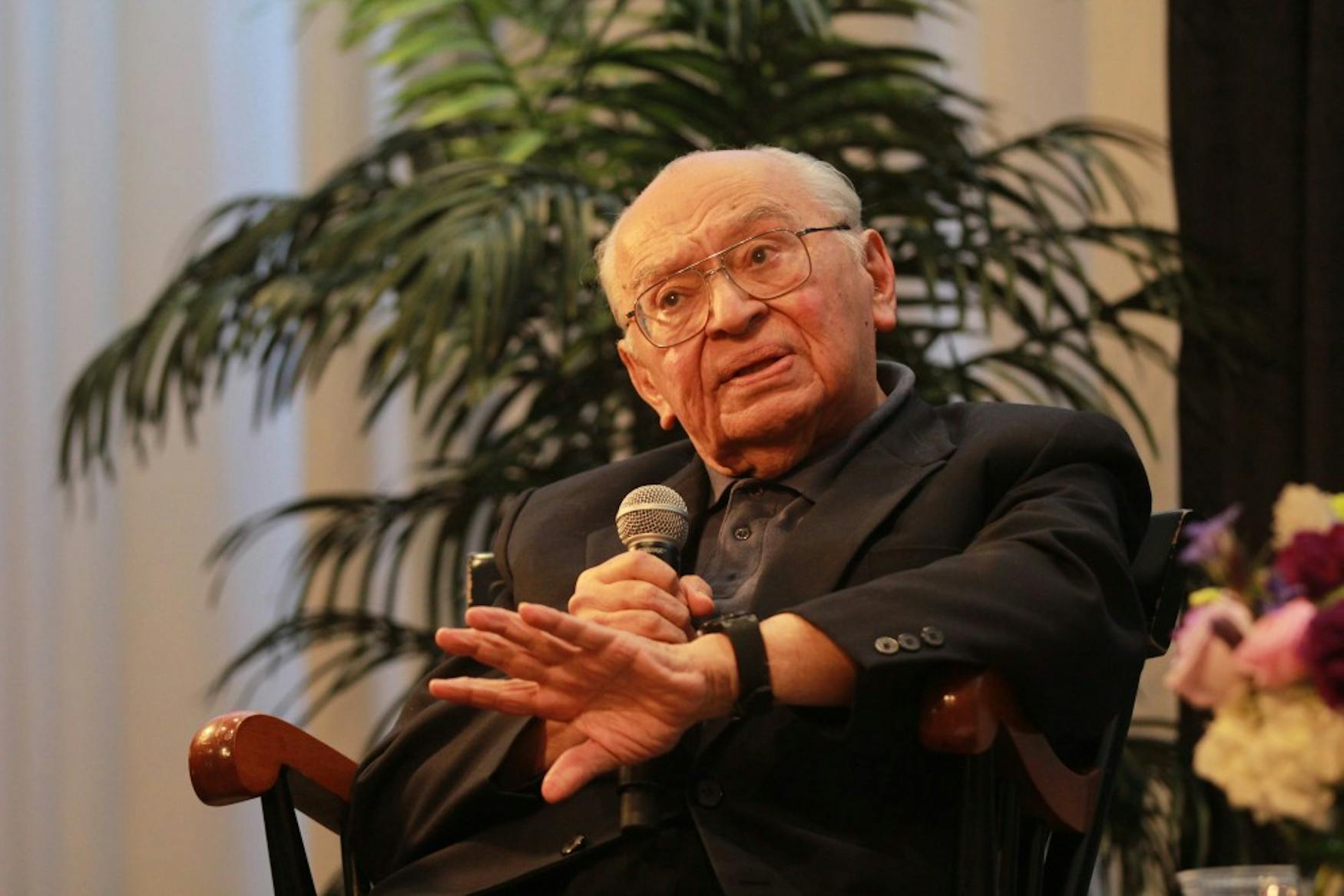Reverend receives Gittler Prize, delivers address
On Sunday, Oct. 5, Brandeis awarded its sixth annual Joseph B. and Toby Gittler Prize to Reverend Gustavo Gutiérrez for his work on Liberation Theology and social activism.
This year’s recipient, Gutiérrez, is a world-renowned Catholic Dominican priest from Peru. According to a Sept. 4 BrandeisNOW article, he is a founder of Liberation Theology, which “combines theology with social activism” by using the teachings of Christianity to help liberate the poor from unjust conditions. His most famous book, A Theology of Liberation: History, Politics and Salvation (1971) has made a remarkable contribution to modern theology, and his work in Latin America against oppression and poverty earned him the Legion of Honor from the French government. He is currently a professor of theology at the University of Notre Dame and holds nearly 20 honorary degrees.
The Gittler Prize ceremony took place in Rapaporte Treasure Hall and began with an introduction by University President Frederick Lawrence, who said that the Gittler Prize represents “the heart of what Brandeis is about.” Catholic Chaplain and Coordinator of the Interfaith Chaplaincy Reverand Walter Cuenin then introduced the prize recipient, Gutiérrez, who received a standing ovation as he approached the stage to speak.
Gutiérrez began his speech by saying he was “surprised” but honored to receive this year’s Gittler Prize. As the founder of Liberation Theology, he explained what theology really is and what it means to him. “Theology is a language; it is a reflection of our mysterious reality,” that, in its most basic definition, helps individuals to communicate, become aware of reality and reflect. It is a combination of silence and time, a “language about relations between humans and being present in history.”
At the core of Liberation Theology is the desire to alleviate the suffering of the poor and impoverished. Gutierrez said that we must do this through the teachings of Christianity, though there is still the difficult question of “how to say to poor people: ‘God loves you’” and make them believe it is true.
However, Gutierrez believes this question is beyond human capacity to answer; Liberation Theology is not an answer to this question, he said, but a way to reflect upon it.
He described Liberation Theology as a “limited effort but necessary” in order to be able to address the “human mystery” of the suffering of the poor and the innocent.
In the second part of his presentation, Gutiérrez addressed the causes and consequences of poverty around the world. Poverty, he said, is unfortunately “an old and complex reality of humanity.” However, he detailed that poverty is not only an economic problem, but also a cultural problem that involves many aspects of culture, race, gender and sexual orientation.
Gutiérrez said that for a long time, people considered poverty a fact or a fate, believing that having rich and poor was “the will of God.”
However, he said that his experience in recent times has taught him that poverty has multiple causes, some even human. Because humans create poverty, it is necessary to work to eliminate it. “Poverty means death,” he said, because poor individuals are dying before their time due to hunger and lack of access to health care and medicine. Poverty creates both cultural and physical death, and because of this, “children are not dying at the end of their lives but at the beginning.”
Gutiérrez’s Liberation Theology, which combines theology with social activism, attempts to help alleviate poverty.
However, his goal is “not to be the voice of the voiceless,” but to “give the voiceless voice”—to “make them agents of their destiny” so that poverty can be correctly addressed and ameliorated. “No one is outside of the love of God,” he said.
The reverend ended his speech with a personal anecdote about the changing nature of the world, poverty and Liberation Theology, comparing it to writing love letters to one’s significant other over a period of time. “To me,” he said, “theology is writing a love letter to God, my people, my church.” As time passes and one writes more love letters, one “can’t repeat the love letter in the same terms, but the love is still there; the content, idea, is still there, but the manner to express it is changing.”
The ceremony concluded with a few questions from the audience and the presentation of the Gittler Prize—a medal—by Lawrence. The ceremony was followed by a reception.
According to the Brandeis website, the Gittler Prize is a prestigious annual award given to an individual who represents “outstanding and lasting scholarly contributions to racial, ethnic and/or religious relations.”
It was created by the late Joseph B. Gittler and includes a medal, ceremony and $25,000 reward. The ceremony is hosted by Brandeis’s International Center for Ethics, Justice and Public Life.



Please note All comments are eligible for publication in The Justice.